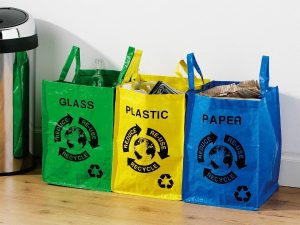Sam Ryan worked for Lowimpact.org in the UK for a year, and is now on his way overland, with his partner Dani, back home to Australia to set up Low-impact Australia over there. He’s going to send us a few blog articles en route. The first one is about skip-diving for food in Norway
Travelling is expensive and terrible for the planet, but it doesn’t have to be. Avoiding air travel when possible, couchsurfing and skip-diving are just a few ways to drastically reduce costs and your impact on the environment.
My partner and I are currently in Norway, having left England in mid-July for an overland trip to South Australia (albeit with one 4.5 hour flight from Singapore to Darwin). The decision to minimise our air travel was originally for environmental reasons, but it soon became obvious that exploring the places we would have otherwise flown over was also going to be much more fun.
Our transport of choice is the train, though buses, hitchiking and boats will all feature in the adventure. The Channel tunnel and Interrail are an amazing gateway to Europe, and overnight trains can be economically justified as they are also a night’s accommodation. The train is a dignified way to travel – ample leg room, a constantly changing view, and a pace that gives some indication of distance. They are also much more conducive to conversation with other passengers, to experiencing cultural differences and seeing the connectivity between places as landscapes evolve. Obviously it has taken longer for us to get to Norway from England than if we flew, but it has allowed us to explore many places along the way. We see travel as a journey, so why not make the entire process as pleasant as possible?
 |
Norway is known to be extremely expensive for those visiting, and it is true that food is around double what you would pay in the UK – though food is still ridiculously cheap as a percentage of income. For our couchsurfing hosts in Bergen, saving money was probably the principal reason behind skip-diving, but they also hated to see food being wasted. I had tried skip-diving in England, but tall gates, locks and CCTV were enough to foil my first and only previous expedition.
The first night we visited around 10 small supermarkets, and walked approximately 8 miles. It was by no means fruitless (though we didn’t find any fruit) as we collected over 1kg of red peppers, a dozen yoghurts just at their use-by date, and a 5 kg bag of rice with the smallest hole in the side. If all of us in the group had jobs, and we spent that time working instead of skip-diving then we would have earned well over 100 quid. It wasn’t economically sensible, but it was great fun exploring the city at 1am and chatting, getting exercise and stopping good food ending up in landfill.
The second night was a remarkable contrast to the first, possibly because it was a Friday and many supermarkets make room for weekend deliveries. We found large quantities of juice and dairy products, at or just after their use-by (which all turned out to be fine), vegetables, bread, crisps and at least 15kg of bananas. Unfortunately 5kg had been crushed by the weight of their counterparts, so we had to leave some behind. This haul was found, taken back home and washed in under an hour – very economically sensible, as well as getting to feel like a triumphant hunter-gatherer as you proudly display your loot to those that stayed at home.
Some of the containers we opened were a bit smelly, and some food we had to leave where it was as it had already gone off. However, most just needed a wash, perhaps a peeling or the squashed bits cut off. We made delicious meals from what we found, and drank a ludicrous number of banana milkshakes.
Follow some simple rules and use common sense:
- Never break into anything or damage property – obviously it is illegal and there are penalties for getting caught
- If you are caught or questioned, explain what you are doing and why, don’t run away or make a fuss – take the path of least resistance
- Take a torch, a friend and something to carry food in without looking too suspicious – a backpack used for traveling is a good idea
- Take only what you will realistically use or give to others – there is no point taking food from one bin to put into another
- Be sensible and follow your nose – use-by dates can be useful, but mould, bulging packets and off smells are much more reliable.








